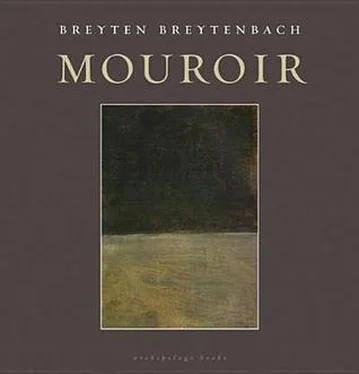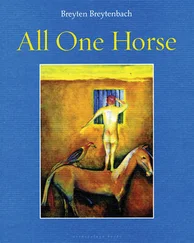Down the corridor he heard the high anxious voice of Gregor Samsa. There was a small space, long but narrow, rather like a waiting room, with a row of chairs down each wall. (Against one wall there was a painting on the theme of Napoleon leaving Moscow; snow already, and flames lapping at the city walls; the fat little fellow in the big, military grey coat. Facing it exactly there was a framed text; “About thirty years earlier four Frenchmen were eaten to celebrate the Fourteenth of July. They had organized a big fête for the natives to inspire them with a patriotic love for France, when, halfway through the festive proceedings, they were suddenly seized by their ungrateful hosts.” Since his student days already Gregor Samsa was a francophile. .) He sat in one of the chairs, a rag doll, arms and hands limp over the arm rests, head thrown back. Over his face he had draped a handkerchief. It was as if he had surrendered himself completely to the senseless words which on a poignant note kept bubbling out of him, insatiably. Like a rhetorician having fudged all limitations and parameters. Angelo remained standing in the dark just inside the door with the icy feeling one has when a well-known face is abruptly unmasked, the features distorted and the facial planes undone into something horrible stalking the edges of your awareness, something which yawns and snarls — but he was nevertheless fascinated. Perhaps five minutes went by before there came a break in the monologue. Gregor Samsa pulls the handkerchief away from his face. His face is a filthy mouth, red and wet. Why do you stand there staring at me with an open mouth? he brutally asks Angelo. Haven’t you ever seen evening prayers? But when Angelo doesn’t react in the least he wipes the sweat from his face with the same handkerchief and continues in a resigned voice: Never mind, you need not be afraid or alarmed, it is all over for the time being — look, I’m absolutely normal. . Please believe me. . Let’s go back to the salon. . Forgive me. .
In the living room the two unhappy women sat waiting. During Angelo’s absence, so they now inform him, a secretary, deus ex machina , called to say that he should return to the city, unexpectedly but urgently, for talks with his agent and publishers. Concerning a question which definitely cannot be solved by telephone. Elefteria who had so looked forward to Giovanna Cenami and Angelo’s visit, probably with the fond hope that it may in some way be of succour to Gregor Samsa, was clearly upset at this reversal of her projects. With drooping shoulders and downcast eyes Gregor Samsa went to sit in the same chair as before. Apparently the news didn’t concern him at all. Only Angelo was briefly and secretly relieved: thank the gods that I need not stay here now, that I have a justified excuse, and there are truly stacks of work and responsibilities. . Why should it be expected of me to help him — just because we were friends when young? People change, circumstances don’t remain the same, Life unfolds, gets folded, wrinkled. . There is a separation, secretion and segregation sometimes. I do not know this man. . And at the same time he stood wondering in which trouser or jacket pocket Gregor Samsa tucked the handkerchief after using it. He could still see the darker stains caused by the pearling perspiration. And he knew then that he couldn’t leave Gregor Samsa in the lurch, couldn’t wipe him off his conscience just like that, not now — and particularly not when thinking of Elefteria. Perhaps, he further reasoned, I can redeem my accountability by suggesting that Gregor Samsa come with me for a little trip to the city. Should he, or they, say “no”, then I’m free after having done my duty. Should he agree, well, it will be good for him to get away from here for a while. And if necessary Giovanna Cenami can remain to keep Elefteria company. Perhaps, he says, Gregor can come with me for a quick there-and-back to the city? At least I’ll have a companion for the road and Giovanna Cenami could well stay here in the meantime so that you women may talk your little talks. Ha-ha-ha. Am I right? He turns to Elefteria.
It was decided, with a view to the urgency of his appointment, that he and Gregor Samsa would depart later that same evening so as to be on time the following day in the city. After supper he had a shower and started dressing. Gregor Samsa was ready, stood waiting in the living room, sharply dressed in an expensive summer suit of some light cloth, his damp old-wheat-coloured hair slicked back and his yellow eyes clean and peaceful. (Now that all the decisions have been taken from his hands.) When Giovanna Cenami had felt the quality of Gregor Samsa’s tailored suit between the thumbs of her eyes, she convinced Angelo in the guestroom to don his best clothes too, of sayette, and to tie a hand-woven tie of black wool around his neck: a different, more sedate elegance, that of an influential author. It was as if the two women wanted to compete.
The night was tight and still except for the quick quivering of wind in the branches and coppices. Like pilot-lights on high masts were the stars in the blown-clear spaces of heaven, like the mirroring in a dark surface of the rain-eyes on leaves. When they leave the big building is a load of darkness behind them, but they could still perceive the murmuring of many voices beyond the walls — it was as if the whole prison were filled with fast-running water. The headlights of Angelo’s Silver Phantom lit up a shallow plane before them, in dust-coloured powder the light-cones for an instant touched the scrubs on either side of the road — the pale plants without chlorophyll, shining — and when later it starts raining again the drops are moths breeding miraculously in the folds of the night, from Saturniidae to oleander hawk and Lophostethus demolini and H. osiris with the sheath like a blade and the death’s-heads whose larvae live on the potato, he, Acherontia atropos (O river of Hades, O Fate!) who, when fully grown, with his yellow abdomen and stocky proboscis and skull emblem will rob the beehives and utter tiny screams there. . Night unfolded. Directly from the front. Gregor Samsa says nothing and his hands are quiet, all trembling gone.
With the climbing of the sun above the ridges they have long since left the wooded area behind them. Not a single cloud in the vicinity. A chain of purplish blue mountains blocked off the horizon in front. Towards nine o’clock they stopped at a filling station. Opposite the road was a motel extending to a café and a supermarket; a little further to the right of the blue asphalt road a town was spread over several hills and in the early morning light, also falling at an angle, the white houses glittered like bottle-shards, so much so that Angelo had to think that these houses were still uncompleted. At a distance beyond these white houses against the slight rise of a further hill with a strip of uninhabited land between the two developments (a no man’s land), the first town’s sister township commenced, a second half. The first building of this location — it looked like an entry gate or perhaps a tollhouse — was big and yellow but also as if snapped in two, all crumpled and with a hump in the centre: exactly as if it had been hit and summarized by an earthquake. Further back then are strung out the other little houses: small, crooked, poor, and of all the colours of the rainbow. It was very clearly the living area for Coloureds as opposed to the preceding area for Uncoloureds. A pump attendant with a big florid face wiped the last tracks of dust from the Silver Phantom’s windscreen with his yellow rag and then planted himself with arms akimbo next to them. With the rag hand he pointed to the shimmering town. Worcester, he said.
Accompanied by the attendant they crossed the road to go and look for breakfast in the roadhouse. They mounted the few steps and pushed open the glass doors. Around smart little tables on high chromed legs several people sat drinking and smoking (although there were no cars parked in front of the motel), mostly farmers from the surrounding fields, with friendly blue-eyed faces and black coats. At the table nearest to the entrance sat a couple, both dressed in Chinese clothes, unaware of the slurping mouths and the looking eyes of the other customers, lost in a game of tiny sticks and cards. Their hands particularly attracted Angelo’s attention: flabby, bleached fingers with red tips in which no graphic of mercy could be detected. When Angelo out of curiosity tried to follow the game from close up, the attendant pulled him by the sleeve over to one side and placed a warning finger to his mouth: they are playing “swallow”, he explained. Cruel? He repeated the unworded question and winked at Gregor Samsa. Isn’t it rather a case of love? And who can stop that? You certainly must know Molière’s La Princesse d’Elide:
Читать дальше












